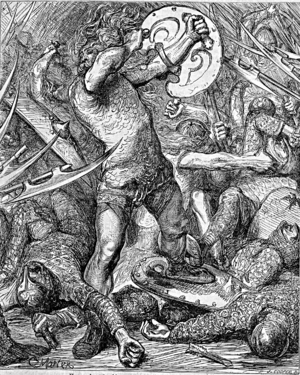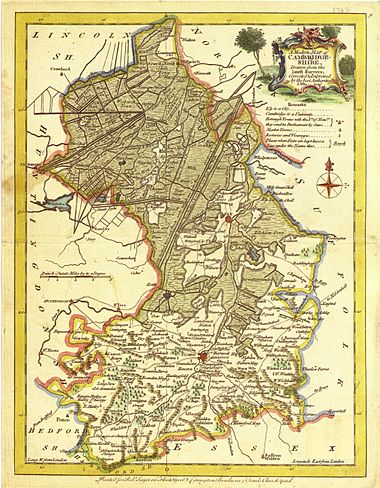Hereward the Wake facts for kids
Hereward the Wake (born around 1035, died around 1072) was an Anglo-Saxon nobleman. He became a famous leader who fought against the Norman Conquest of England. The Normans, led by William the Conqueror, took over England in 1066.
Hereward's main base for his rebellion was the Isle of Ely in eastern England. Legend says he roamed the marshy lands known as the Fens. This area covers parts of what are now Cambridgeshire, Lincolnshire, and Norfolk. He led many people who opposed William the Conqueror.
The name Hereward is an old English name. It means "army guard." The nickname "the Wake" was first used much later, in the 1300s. It might mean "the watchful" or come from the Wake family, who later said they were related to him.
Contents
Who Was Hereward the Wake?
Hereward the Wake was a real person, but many stories about him are mixed with legend. We learn about him from old writings like the Anglo-Saxon Chronicle and the Liber Eliensis. The most detailed story comes from a book called the Gesta Herewardi.
These old texts sometimes tell different versions of events. For example, one story says Hereward attacked Peterborough Abbey after a big battle. Another says he attacked it before. This shows that people told different tales about Hereward even back then. Some writers might have had their own reasons for telling the story a certain way. For instance, the monks at Peterborough Abbey, whose monastery Hereward supposedly attacked, wrote their own account.
The Gesta Herewardi Story
The Gesta Herewardi is a Latin text written around 1109–1131. It claims to be a translation of an older, lost English story. The author said he filled in missing parts from stories people told by word of mouth. The oldest copy we have was made around the mid-1200s.
The prologue of the Gesta says the original story was written by Leofric. He was a priest in Hereward's household and fought alongside him. Leofric's story might have been written after Hereward died. The author of the Gesta was told to find Leofric's damaged work and translate it into Latin. He added details from oral history to complete the story.
Hereward's Life and Adventures
His Family and Early Life
Hereward's exact family is a bit of a mystery. The Gesta says his mother was Edith and his father was Leofric of Bourne. Some people have suggested that Leofric, Earl of Mercia and Lady Godiva were his parents. However, there is no real proof for this. If he were from such a famous family, it would likely be recorded.
Hereward was probably born around 1035 or 1044. The Gesta Herewardi says he was sent away from home when he was 18. This was because he was disobedient and caused trouble. He was declared an outlaw by King Edward the Confessor.
His birthplace is thought to be near Bourne in Lincolnshire. Old records show he owned land in this area. It was a very boggy and marshy place back then.
Life in Exile
The Gesta Herewardi tells many stories about Hereward's adventures while he was exiled. It says he traveled to Cornwall, Ireland, and Flanders (modern-day Belgium and Netherlands). These tales include fighting a giant bear and rescuing a princess. Many historians think these stories are mostly made up.
However, his time in Flanders seems more likely to be true. He worked as a successful soldier for hire there. He even took part in tournaments. While in Flanders, Hereward is said to have married a wealthy woman named Turfida. She supposedly fell in love with him after hearing about his brave deeds.
Return to England and Rebellion
The Gesta Herewardi says Hereward came back to England in 1067. He found that the Normans had taken his family's lands. His brother had been killed, and his head was put on a spike. Hereward got revenge on the Normans who killed his brother. He gathered followers and went to Peterborough Abbey to be knighted by his uncle, Abbot Brand.
In 1070, Hereward joined a rebellion against the Normans on the Isle of Ely. The Danish king Sweyn Estrithson sent an army to help. Hereward and the Danes attacked and looted Peterborough Abbey. He claimed he wanted to save the Abbey's treasures from the new Norman abbot. However, another old record says the treasure was taken to Denmark.
Later, Morcar, a Saxon earl who had been removed by William, joined Hereward. In 1071, William the Conqueror sent a large army to crush the rebels. Hereward and Morcar made a final stand on the Isle of Ely. The Normans tried to attack across the marshes, but their wooden causeway sank. The Gesta also tells a wild story about Hereward setting fire to a tower with a witch in it!
It is believed that the Normans eventually bribed the monks on the island. The monks showed them a secret path through the marshes. This led to Ely being captured. Morcar was caught and imprisoned. But Hereward is said to have escaped into the wild fenland and kept fighting. All the early stories agree that he got away.
What Happened Next?
There are different ideas about what happened to Hereward after Ely fell. The Gesta Herewardi says he tried to make peace with William. But he got into a fight, was captured, and then rescued by his followers. Eventually, he was pardoned by William and lived peacefully. It also says he married a second wife, Alftruda.
Another story says Hereward lived as an outlaw in the Fens for a while. But as he was about to make peace with William, Norman knights attacked and killed him. It's also possible he was never pardoned and simply went into exile, never to be heard from again. This was a common fate for many English nobles after the Norman Conquest.
The Name "the Wake"
The nickname "the Wake" means "the watchful." It first appeared in the late 1300s. One idea is that Hereward earned it by being very alert and stopping an assassination attempt. Another idea is that the Wake family, who later owned Hereward's land, gave him this name. They did this to suggest they were related to him and to make their claim to the land seem more rightful.
Hereward's Place in History
Hereward the Wake was a real person, but many stories about his brave deeds are likely exaggerated. The Gesta Herewardi was probably written to entertain people and show Hereward as a great English hero. It made him seem chivalrous and always motivated by good reasons.
Hereward's fight against the Normans is mentioned in early historical records. However, these records don't give many details about his life beyond his role in the Ely rebellion. Over time, his story grew. By the 1400s, the Wake family claimed to be his descendants.
Hereward was not a super famous figure until the Victorian era (the 1800s). At that time, people became very interested in English heroes who fought against the Normans. Charles Kingsley's 1865 novel, Hereward the Wake: the Last of the English, made him a national hero. This book, like Walter Scott's Ivanhoe, helped create the idea of a romantic Anglo-Saxon England that was crushed by Norman rule. After this, Hereward appeared in many popular history books.
Hereward's Legacy Today
Hereward the Wake's name lives on in many ways:
- A Royal Navy destroyer ship, HMS Hereward, was named after him.
- "Hereward" is the motto of No. 2 Squadron RAF, a Royal Air Force squadron.
- A BR standard class 7 steam locomotive, No 70037, was named "Hereward the Wake."
- There is a long walking path called the Hereward Way that goes through the Cambridgeshire fenland.
- A local radio station in Peterborough was called Hereward FM for many years.
- A housing association in East Cambridgeshire was named "Hereward Housing."
- There are schools named Hereward House School in Hampstead, London, and a primary school in Loughton.
- Coventry has Hereward College, a college for students with disabilities.
- Hereward Hall is a boys' boarding house at King's Ely school.
- A clipper ship, Hereward, built in 1877, was wrecked at Maroubra Beach in 1898.
- A type of wheat called Hereward was very important for making bread in the UK in the 1990s and 2000s.
See also
- Courteenhall, Northamptonshire home of the Wake family who claim descent from Hereward.
 | Percy Lavon Julian |
 | Katherine Johnson |
 | George Washington Carver |
 | Annie Easley |



